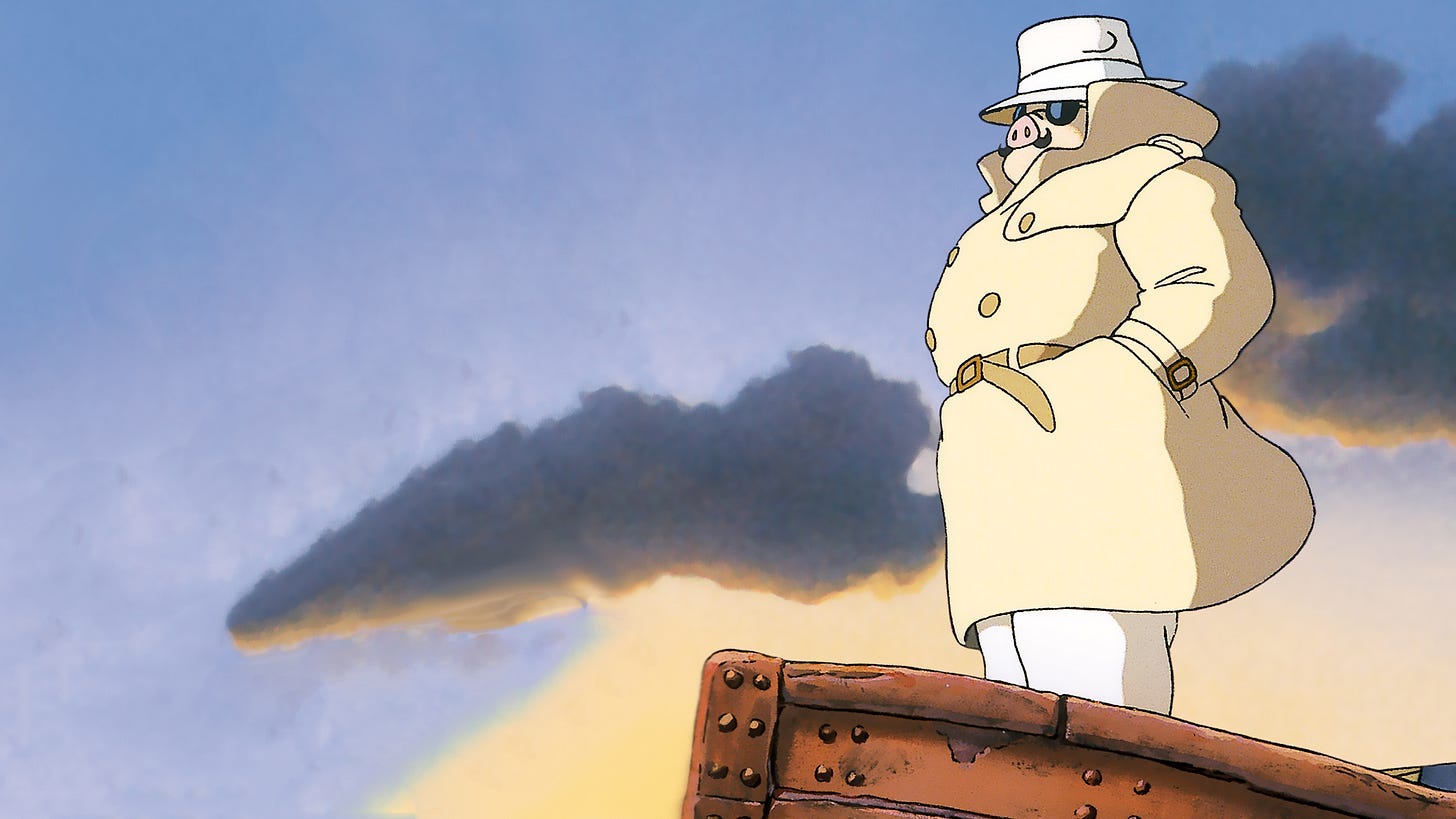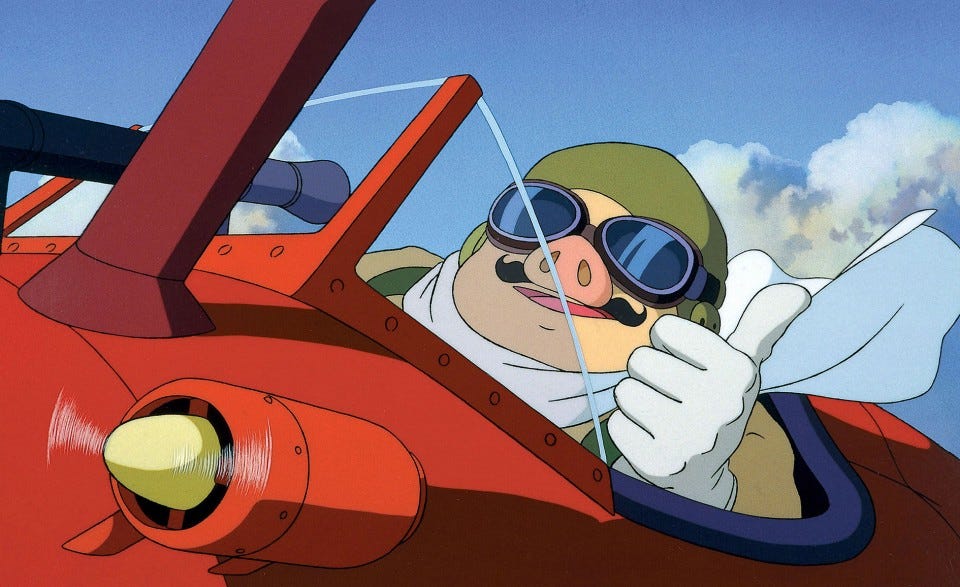Originally published in 2015 at Entropy Magazine.
2015 is the 30th anniversary of the founding of Studio Ghibli and, according to Hayao Miyazaki, it may also be one of its final years as a studio. Because this is one of my favorite films studios and Miyazaki is one of my favorite artists, who’s made some of my favorite films, I’ve decided to go through the history of Studio Ghibli one film at a time.
If you’re looking for the discussions of the previous weeks:
This does, however, mean I won’t be discussing Nausicaa of the Valley of the Wind, which was made before the founding of the studio.
I’ll also only be discussing the Japanese audio version of the films, though that doesn’t mean the dubs are bad or not worth seeing. They’re just slightly different. I’ll also be discussing these with the assumption that they’ve been seen by you. So, yes, spoilers are below.
Perhaps the strangest thing about Porco Rosso is that it was made at all. It’s strange that Miyazaki’s follow up to Kiki’s Delivery Service and My Neighbor Totoro is this peculiar film that’s sort of small and narrow, in certain ways. Porco Rosso begins nowhere and ends back there, or somewhere like it, while only hinting at movement beyond, beneath, and above. This feels like it was made by someone else. Or rather, it feels like a film anyone could have made, which is about as unMiyazaki as you can get, I think.
In the Miyazaki documentary, he says that he regrets making Porco Rosso, which is an odd statement that only really makes sense if you watch the documentary. He goes on to say that it didn’t make sense for him to make it, and I have to agree with this.
It’s strange that this film was made, but the strangest thing about it is that Miyazaki made it. I mean, it has his fingers all over it. It’s undeniably Miyazaki. The animation is stunning, the attention to character and behavior, the majesty of the world and natural beauty, some strong female characters [though perhaps the weakest of any woman he’s ever created]–all of these things scream Miyazaki.
It’s just not what we’ve come to expect from him or even really what we want from him.
Oddly enough, I think this may be a particularly personal film to Miyazaki.
This is pure speculation, mind, but I think this is his only film that actually contains him as a character.
So, I’ll admit–and I’ve mentioned it before–I’ve never been a big fan of this film. To write this review I watched it for the second time and I’m still unimpressed by it, but I did enjoy it well enough for what it is. But the only part that really feels like Miyazaki, to me, is Marco.
Marco–or Porco, our protagonist–is an extremely serious character stuck in a comedy. Because this film, more than any of his others, is, to me, most clearly a comedy. It’s all quite silly and sort of lighthearted, even though it takes place during one of the most serious points in the last century of Italian history. And I think this is probably the most interesting thing about the film: we have a very serious character living in a very serious and dire point in history, but the story he’s stuck in is a comedy.
I see Miyazaki here maybe more clearly than I’ve seen him in any of his other films. I mean, the Nausicaa manga and Princess Mononoke are probably his clearest statements about the world and humanity and their relationship to one another, but Porco Rosso contains him as a person, not as an ideology.
I don’t think I would have made this connection had I not watched The Kingdom of Dreams and Madness before seeing this again. Throughout that documentary, Miyazaki is sort of constantly saying really dark and pessimistic and misanthropic things, but he’s also usually smiling.
I think Miyazaki is a very serious person who finds life absurd to the point of hilarity. He’s kind of hopeless with regard to humanity and the future of our species, but he doesn’t care either. He looks forward to the days when nature will take the earth back from us.
But let’s talk about Porco, the character.
He’s an ace pilot from WWI who forsakes his own humanity and becomes a pig. He chooses to avoid humanity as much as he can. The only thing he seems to care about is flying and helping people when possible, so long as he can make some more money and keep his plane aloft. He’s an amoral character in many ways. He reminds me of Bogart from Casablanca–world weary, war weary, hiding out at the edges of civilisation, just trying to get by, trying to forget the tragedy that he lived through.
Porco cares very little for humanity. He looks at them and sees nothing worth liking or even saving. He has his friends, and that’s enough.
This is especially interesting because we’re seeing the rise of fascism in the film. They’re not overt, if you don’t know the signs, but they’re everywhere.
I’d rather be a pig than a fascist.
Porco’s words here are kind of hilarious, in that he already is a pig, literally, but they’re also surprising because he has no interest in standing up to fascism. Or at least it seems that way. He opposes it, sure, but he’s not fighting it. He’s just avoiding it, as much as he can.
He’s a broken man. So broken he stopped being human. So broken that he simply watches the world turn.
As long as he can ride through the sky, everything else can rot.
Miyazaki’s own love of flight is well documented. It’s why so many of his character end up flying through the air at one point or another. But this love is most deeply shared with Marco.
To me, it feels like Marco is the most similar to Miyazaki and this film feels close to his heart. I can’t really think of another reason for such an odd film to be made. It’s a profoundly pessimistic film while also probably being his funniest, most absurd, and lighthearted. I mean, we have a character who lived through WWI, witnessed the Deaths of most of his friends and countrymen. He gives up his humanity and then actively avoids relationships and connections with other humans. He gets roped into the pettiest dispute imaginable and the rest of the film deals with this same sort of silly, petty, and absurd competition. Then, as he flies off into the sunset–maybe even full of hope and love–fascism takes hold of Italy and Germany and a new world war erupts.
The film isn’t about WWI or WWII or fascism, but that context and framework make the film more interesting. Or, to put it another way: the most interesting things about the film aren’t in the film.
Because this is a silly film!
The pirates are an absurd and hilarious troupe of bumbling buffoons. The American pilot, Curtis, is ridiculous and is probably the closest thing to a stock character that Miyazaki’s ever done. Even Porco Rosso is absurd! He lets himself be goaded and pulled into a nonsensical dispute which began for almost no reason at all. Curtis is only seeking fame and fortune and he shoots down Porco without regard for his life or anything at all. He just tries to murder him for fame!
The film is held together by its insistence on remaining absurd, because none of it really makes that much sense. Especially for the film to climax in a silly fist fight between two stubborn idiots–a fameseeker and an anthropomorphic pig–fighting over a teenage girl and money.
What makes this even odder is that it’s the first of Miyazaki’s film to be most clearly set in the real world. It’s also the first to be about adults and the first to have a mostly male cast. It’s not a fantasy like the rest of his films, but is more magic realism than anything else. But the magic realism is a light butterfly kind of touch.
I mean, there are no Catbuses or floating castles here. Just a pig flying a plane, fighting with a future moviestar.
This is actually a very well loved Miyazaki film. Its rating on Rotten Tomatoes is through the roof. It was his biggest financial success at the time of its release. I know people who absolutely love this film.
But I simply don’t.
I think it’s a good enough film. I enjoy watching it. But I come to Miyazaki to be transformed or to recapture parts of myself that I lost.
Porco Rosso doesn’t give me any of that.
To me, I think of it as a periscope to Miyazaki’s personality. It holds his pessimism, his misanthropy, but it does it all with a laugh and a smile. Marco flies off to a future that is both horrifying and awful, and I think that’s how Miyazaki sees the future.
And somehow, this is just a funny and silly film.
It’s worth watching and worth loving, but it’s really just not for me.
I think this is the weakest film Miyazaki’s ever made in about every possible way. It’s the least ambitious and says the least about humans and the world. While it may be the funniest of his films, it’s a shallow kind of humor, I think, with very few emotions involved. His other films have less comedy but their moments of levity hit us harder and deeper because those films really take us places. They challenge us emotionally and so when we laugh, it rises from the depths.
I still think Porco Rosso is a complete anomaly and oddity, but I imagine it’s something Miyazaki just had to do.
It’s worth watching and it may just become your favorite of the Studio Ghibli films.
If nothing else, it’s worth seeing just for Porco’s jowls flapping in the wind.
Next week we’re heading back to Isao Takahata and Pom Poko, which is another very odd film to come out of Studio Ghibli.





